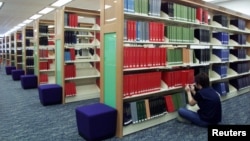Hundreds of political books have been pulled from Hong Kong libraries in a move that analysts say is part of an ideological drive to purge “harmful” influences from the city that was once the bastion of freedom in Asia.
This week, Hong Kong media reported that a number of books related to the 1989 military crackdown on the Tiananmen pro-democracy movement in Beijing, along with books by authors seen as pro-independence or pro-democracy, can no longer be found in libraries.
After implementation of a national security law in 2020, authorities also banned an annual candlelight vigil for Tiananmen victims, which for decades was the only one allowed on Chinese soil.
A Thursday search of Hong Kong Public Libraries’ catalog yielded no result on titles related to the 1989 crackdown. Searches of some keywords such as “1989 pro-democracy movement” or “June 4, 1989” yielded no result while “Tiananmen,” “revolution” yielded mainland Chinese titles unrelated to the event.
The latest removals came after government auditors instructed the leisure and cultural services department, which operates Hong Kong’s libraries, to “step up efforts in examining library materials for safeguarding national security.”
The audit commission report, published last month, said Hong Kong Public Libraries had began to review books for potential breaches of national security law in 2021 and had recently completed a preliminary review that focused on authors and publishers who “had allegedly published books on ‘Hong Kong independence.’”
“Whenever content found to have violated the Hong Kong national security law or other laws, lending services would be suspended,” it said of the 2 million titles in the city’s libraries. It said the review was continuing, with no end date.
A number of books by well-known opposition figures such as Jimmy Lai and Joshua Wong -- now both in custody -- had already been purged from public libraries earlier. This week, titles by veteran cartoonist Wong Kei-kwan - some dating back to the 1990s - were found to have been removed from public libraries after his 40-year column was axed by Ming Pao, a respected Chinese-language newspaper.
Ming Pao, which has been monitoring public library collections in the past few years, reported that about 40%, or 195 titles, of politically themed books, magazines and videos available at the end of 2020 have been removed, with 96 taken off the shelves during the past year. It said a number of documentaries, including those produced by the public broadcaster RTHK, were also absent. Many books by political scientists and pro-democracy politicians disappeared as recently as May 10. As of late April, 46 items related to Tiananmen were still available, but now there is one left.
On Thursday, Hong Kong’s top leader and former police chief John Lee said his government has a duty to foster “correct values” in society. Public library books cannot breach the law and contain “unhealthy ideologies,” he said.
In 2021, Security bureau chief Tang Ping-keung had said the cultural and media sectors were an emerging source of national security threats, as activists use them as platforms to push “soft resistance.”
Implemented in 2020 to stamp out the monthslong anti-government protests, the national security law lays out penalties as severe as life imprisonment for crimes including secession, subversion, terrorism and collusion with foreign forces. It has mostly been used to target freedom of expression, with about 70% of some 240 arrests related to alleged speech crimes.
The Chinese Communist Party, since the 1940s, before it took power, has always stressed that the arts must serve the party. Under the current leadership, it increasingly tightened control on the media and the cultural sectors to ensure they adhere to the official narrative.
Those who stray are punished. Five speech therapists were jailed last year for 19 months for producing “seditious publications” in the form of children’s books that depicted sheep trying to defend their village from wolves. Two were arrested this year for possessing them.
Chen Daoyin, a political scientist formerly with the Shanghai University of Political Science and Law who is now living abroad, said the authorities are “reconstructing Hong Kong people’s political and historical memory.”
He added that the purging of books that are dissonant with the official narrative is part of China’s broader plan to impose its ideology among Hong Kongers. The authorities want them to identify with China’s governance and historical legitimacy, he said.
According to the most recent World Press Freedom Index compiled by Reporters Without Borders, Hong Kong ranks 140th out of 180.






